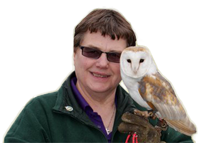Conservation
SOME OF THE MANY PROBLEMS FACED BY OWLS IN THE WILD
Sadly all our native species of Owl are in decline, this is due to a combination of things which include:
- Loss of habitat - This is due to the change in farming practices and the loss or conversion of the many barns that were once used by Barn Owls and Little Owls. It is an offence to disturb nesting Owls and all Owls are protected by law.
- The increase in large motorways and road traffic - This is the biggest cause of death for most of our Owls, especially the Barn Owl which frequently hunts on the grass verges by the side of our roads.
- Ingesting poison through the food chain - Owls live mainly on small rodents, some of which will have eaten poison. This is a problem for Owls living near farms where the farmer uses poison to control rats and mice.
- Drowning - Water troughs, water butts and even large buckets left out for animals to drink from can cause an Owl to drown. Owls have feathers that soak up water very quickly and they become waterlogged.
- Electrocution - Owls sometimes collide with power lines which usually proves fatal to them.
- Predators - Larger Birds of Prey will take an Owl. Foxes and cats can also kill Owls.
- Starvation - Many Owls starve during the winter when prey is harder to find. They cannot hunt during very wet and windy weather as their feathers are not waterproof. Also a deep covering of snow makes locating prey much harder for them. Owls need to put on weight to get into condition for the breeding season; if they cannot find enough food, many Owls will not breed.
HERE ARE JUST A FEW THINGS THAT THE LARGER COMMUNITY COULD DO
TO HELP IN THE CONSERVATION OF OWLS, AND OTHER BIRDS OF PREY
Farmers and Landowners can leave large margins around their fields, leave field set aside and also let the hedges grow taller. Farmers who convert or take down old barns can put up Owl Nesting Boxes for the Owls to nest in.
Drivers can be more aware at night when Owls are more active and frequently swoop over the road; sometimes Owls will even sit in the road.
If you have owls on your property let them keep your rodents down; they do it in an environmentally friendly way. If you have to use poison get advice on the most wildlife friendly one and be careful where you site it.
If you have water troughs on your land float something on the top; the bottom of an old plastic bread tray is ideal. Also encourage other people to do the same.
Anyone can put up an Owl Nesting Box if they have the right habitat, but get advice first as if it is not sited correctly you will not get any Owls in it. You may have to be very patient, not many people are lucky enough to get Owls in their nice new box overnight.
Leave a wild area on your land, or at the bottom of your garden where the voles and other small mammals, that Owls rely on for food, can breed.
If you see someone disturbing an Owl or it's nest site, report it to your local Police or Wildlife Crime Officer.




